Monday, May 27th 2019

AMD Announces 3rd Generation Ryzen Desktop Processors
AMD CEO Dr. Lisa Su at her 2019 Computex keynote address announced the 3rd generation Ryzen desktop processor family, which leverages the company's Zen 2 microarchitecture, and are built on the 7 nm silicon fabrication process at TSMC. Designed for the AM4 CPU socket, with backwards compatibility for older AMD 300-series and 400-series chipset motherboards, these processors are multi-chip modules of up to two 8-core "Zen 2" CPU chiplets, and a 14 nm I/O controller die that packs the dual-channel DDR4 memory controller and PCI-Express gen 4.0 root complex, along with some SoC connectivity. AMD claims an IPC increase of 15 percent over Zen 1, and higher clock speeds leveraging 7 nm, which add up to significantly higher performance over the current generation. AMD bolstered the core's FPU (floating-point unit), and doubled the cache sizes.
AMD unveiled three high-end SKUs for now, the $329 Ryzen 7 3700X, the $399 Ryzen 7 3800X, and the $499 Ryzen 9 3900X. The 3700X and 3800X are 8-core/16-thread parts with a single CPU chiplet. The 3700X is clocked at 3.60 GHz with 4.40 GHz maximum boost frequency, just 65 Watts TDP and will be beat Intel's Core i7-9700K both at gaming and productivity. The 3800X tops that with 3.90 GHz nominal, 4.50 GHz boost, 105W TDP, and beat the Core i9-9900K at gaming and productivity. AMD went a step further at launched the new Ryzen 9 brand with the 3900X, which is a 12-core/24-thread processor clocked at 3.80 GHz, which 4.60 boost, 72 MB of total cache, 105W TDP, and performance that not only beats the i9-9900K, but also the i9-9920X 12-core/24-thread HEDT processor despite two fewer memory channels. AMD focused on gaming performance with Zen 2, with wider FPU, improved branch prediction, and several micro-architectural improvements contributing to a per-core performance that's higher than Intel's. The processors go on sale on 7/7/2019.When paired with an AMD X570 chipset motherboard, these processors make up the world's first PCI-Express gen 4.0 based desktop platform. PCIe gen 4.0 doubles per-lane data bandwidth to 16 Gbps. The Ryzen 3000 "Zen 2" processor puts out 24 PCIe gen 4.0 lanes externally, from which 16 lanes are meant for graphics cards, 4 lanes for an M.2 NVMe slot, and 4 as chipset-bus. The X570 chipset puts out 16 downstream PCIe gen 4.0 lanes, which means up to two additional M.2 slots, and more onboard connectivity. The total platform PCIe lane budget has shot up to 40 lanes, all of which are gen 4.0. AMD put out 3DMark PCIe bandwidth feature-test performance numbers comparing a Radeon RX 5700 "Navi" graphics cards on a Ryzen 7 3800X vs. an RTX 2080 Ti a PCIe gen 3.0 platform powered by Core i9-9900K. The performance was significantly higher.Much of AMD's engineering effort with Zen 2 has been to increase the CPU core's overall math performance, which translated to higher IPC (by 15 percent), increased per-core performance, and conversely higher gaming performance. AMD put out some astonishing gaming performance numbers, in which it compared a 3800X to its own 2700X from the previous generation. You see a staggering 22 percent increase in PUBG frame-rates, and up to 34 percent increase in CS:GO. This may look like insignificant e-Sports titles as opposed to the big AAA ones, but give valuable insights to the chip's gaming prowess. We're convinced that Zen 2 will be faster than any Intel processor at gaming when it comes out.
AMD unveiled three high-end SKUs for now, the $329 Ryzen 7 3700X, the $399 Ryzen 7 3800X, and the $499 Ryzen 9 3900X. The 3700X and 3800X are 8-core/16-thread parts with a single CPU chiplet. The 3700X is clocked at 3.60 GHz with 4.40 GHz maximum boost frequency, just 65 Watts TDP and will be beat Intel's Core i7-9700K both at gaming and productivity. The 3800X tops that with 3.90 GHz nominal, 4.50 GHz boost, 105W TDP, and beat the Core i9-9900K at gaming and productivity. AMD went a step further at launched the new Ryzen 9 brand with the 3900X, which is a 12-core/24-thread processor clocked at 3.80 GHz, which 4.60 boost, 72 MB of total cache, 105W TDP, and performance that not only beats the i9-9900K, but also the i9-9920X 12-core/24-thread HEDT processor despite two fewer memory channels. AMD focused on gaming performance with Zen 2, with wider FPU, improved branch prediction, and several micro-architectural improvements contributing to a per-core performance that's higher than Intel's. The processors go on sale on 7/7/2019.When paired with an AMD X570 chipset motherboard, these processors make up the world's first PCI-Express gen 4.0 based desktop platform. PCIe gen 4.0 doubles per-lane data bandwidth to 16 Gbps. The Ryzen 3000 "Zen 2" processor puts out 24 PCIe gen 4.0 lanes externally, from which 16 lanes are meant for graphics cards, 4 lanes for an M.2 NVMe slot, and 4 as chipset-bus. The X570 chipset puts out 16 downstream PCIe gen 4.0 lanes, which means up to two additional M.2 slots, and more onboard connectivity. The total platform PCIe lane budget has shot up to 40 lanes, all of which are gen 4.0. AMD put out 3DMark PCIe bandwidth feature-test performance numbers comparing a Radeon RX 5700 "Navi" graphics cards on a Ryzen 7 3800X vs. an RTX 2080 Ti a PCIe gen 3.0 platform powered by Core i9-9900K. The performance was significantly higher.Much of AMD's engineering effort with Zen 2 has been to increase the CPU core's overall math performance, which translated to higher IPC (by 15 percent), increased per-core performance, and conversely higher gaming performance. AMD put out some astonishing gaming performance numbers, in which it compared a 3800X to its own 2700X from the previous generation. You see a staggering 22 percent increase in PUBG frame-rates, and up to 34 percent increase in CS:GO. This may look like insignificant e-Sports titles as opposed to the big AAA ones, but give valuable insights to the chip's gaming prowess. We're convinced that Zen 2 will be faster than any Intel processor at gaming when it comes out.
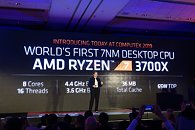
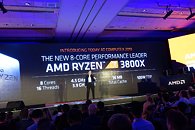
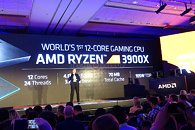
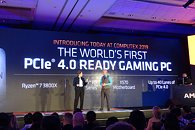


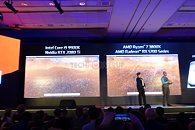
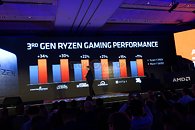
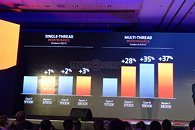
95 Comments on AMD Announces 3rd Generation Ryzen Desktop Processors
Can't wait to see performance in real world / reviews. But I think Intel's going to be smoked in that last remaining bastion of gaming on MSDT. With that, all things considered there is literally no reason for a consumer to get any Intel CPU. There's no price advantage, there's less certainty wrt security / flaws that are yet to come and already in place, there's no performance advantage and no perf/watt to win.
Now its time for the knockout punch with some solid Navi-based APUs, because that's what RDNA (GCN *cough*) is going to be competitive at: integrated graphics. I don't see much purpose for it otherwise at this point. AMD really needs to get serious about laptops.
I have one use case for that, starcraft 2! :p
I have not noticed any bottlenecks apart from that.
Sitting on their laurels for how many years? Rehashing SkyLake for how many times? Six already? They should scrap their 10nm plans and go straight to 7nm.
I'm so happy for AMD. Zen 2 will not just be faster in terms of IPC, it will be faster in pretty much all workloads despite its 10% frequency deficit (5GHz vs 4.5GHz). And in terms of TDP Intel is just ... not competitive at all any more.
What a day to be alive.
The underdog finally defeats Goliath.
1) 15% IPC increase is good but peoples tend to forget that this is compared to Zen not Zen+ . On top of that we have still to wait for actual reviews to confirm those numbers .
2) 4,6Ghz is good and i know clockspeed is not everything but im not going to lie i was expecting more from a cutting edge process like 7nm ( considering 4,3Ghz is already possible on 12nm ) . Maybe there is some OC headroom but i doubt .
3) No improvement on core count for R3 R5 R7 , sure now you have a 12cores part but that's a new segment ( R9 ) .
4) The most important factor imo which contributes to the disapointement is that there is no real improvement on pricing either . Small chiplets should allow for much better yields thus better pricing compared to previous generations but that's not the case for R7 and R5 . On top of that 2000 series retail for dirty cheap nowadays making 3000 series pricing look even worst .
Don't get me wrong Ryzen 3000 series should be solid products considering Zen and Zen+ where already great but to my eyes AMD missed a gold opportunity to put the nails on Intels coffin by increasing core count and offering lower prices on all segments. Looks like AMD is going for the more conservative/safe approach along with bigger margins wich is far from ideal considering Intel will wake up sooner or later so AMD needs to create a gap before that happens instead of simply matching Intel !
7/7 is so far away now...
I expected AMD to be better than Intel when it comes to "lying".
Also 95% of the motherboards have fans. From all the MSI models, only the 300€ one didn´t have a fan and that´s a huge price for a motherboard.
Tbh with it being 7nm, is rather unimpressive.
But really, all things considered... including a price gap that is now even more significant (you don't need top end Ryzen to fight top end Intel on gaming or other tasks, 8c16t is readily available at multiple price points), Intel's relevance is reduced to nearly zero.
Oh, and be careful not to install too many mitigations because you might actually lose the comparison altogether ;) And no guarantees that there won't be any more of those...You say that but look at the above quote :rolleyes:
We can argue the 12c/24t CPU is the big new on this launch, because it will obliterate anything Intel has to offer while being cheaper than the HEDT solutions (and better). But I can´t see the fuss on the 8/16 and 6/12 chips. Their MRSP seems similar to Intel prices and no indications at all that they will be superior. Also I´m not liking the X570 platform at all, with such high power consumption/fans. Steven from GamerNexus said so far that´s the biggest let down. X570 doesn´t seem as refined as it should be. The 6 core and 8 core do not bring anything new to the table performance wise, only if you compare them with previous AMD models.
Zen2 vs Zen = 15% IPC increase
Zen2 vs Zen+ = 1.15 / 1.03 = 11.7% IPC increase.
They didn't gain as much market share as they could, but it's hard to imagine they'll gain less than before with an improved product lineup.
In the slides AMD showed is 13%.